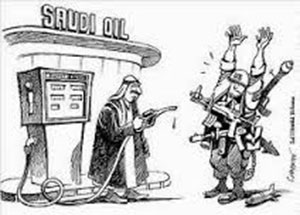America’s Middle East policies are failing, we are told, and the best evidence is that Saudi Arabia is furious. Dick Cheney, John McCain and Lindsey Graham have all sounded the alarm about Riyadh’s recent rejection of a seat on the U.N. Security Council. But whatever one thinks of the Obama Administration’s handling of the region, surely the last measure of American foreign policy should be how it is received by the House of Saud, wrote Fareed Zakaria in the Time.
If there were a prize for Most Irresponsible Foreign Policy it would surely be awarded to Saudi Arabia. It is the nation most responsible for the rise of Islamic radicalism and militancy around the world. Over the past four decades, the kingdom’s immense oil wealth has been used to underwrite the export of an extreme, intolerant and violent version of Islam preached by its Wahhabi clerics, added Zakaria.
Go anywhere in the world–from Germany to Indonesia–and you’ll find Islamic centers flush with Saudi money, spouting intolerance and hate. In 2007, Stuart Levey, then a top Treasury official, told ABC News, “If I could snap my fingers and cut off the funding from one country, it would be Saudi Arabia.” When confronted with the evidence, Saudi officials often claim these funds flow from private individuals and foundations and the government has no control over them.
But many of the foundations were set up by the government or key members of the royal family, and none could operate in defiance of national policy; the country is an absolute monarchy. In a December 2009 cable, leaked by WikiLeaks in 2010, then Secretary of State Hillary Clinton confirmed that Saudi Arabia remained a “critical financial base” for terrorism and that Riyadh “has taken only limited action” to stop the flow of funds to the Taliban and other such groups.
Saudi Arabia was one of only three countries in the world to recognize and support the Taliban-led government in Afghanistan until the 9/11 attacks. It is also a major player in Pakistan, now home to most of the world’s deadliest terrorists. The country’s former Law Minister Iqbal Haider told Deutsche Welle, the German news agency, in August 2012, “Whether they are the Taliban or Lashkar-e-Taiba, their ideology is Saudi Wahhabi without an iota of doubt.” He added that there was no doubt Saudi Arabia was supporting Wahhabi groups throughout his country.
The Time pointed out that Saudi Arabia’s objections to the Obama Administration’s policies toward Syria and Iran are not framed by humanitarian concerns for the people of those countries. They are rooted in a pervasive anti-Shi’ite ideology. Riyadh has long treated all other versions and sects of Islam as heresy and condoned the oppression of those groups. A 2009 report from Human Rights Watch details the ways in which the Saudi government, clerics, religious police and schools systematically discriminate against the local Shi’ite population, including arrests, beatings and, on occasion, the use of live ammunition. (And not just the Shi’ites. In March 2012, Saudi Arabia’s Grand Mufti issued a fatwa declaring that it was “necessary to destroy all the churches in the Arabian Peninsula.”)
The regime fears that any kind of empowerment of the Shi’ites anywhere could embolden the 15% of Saudi Arabia’s population that is Shi’ite–and happens to live in the part of the country where most of its oil reserves can be found. That’s why the Saudis sent troops into neighboring Bahrain during the so-called Arab Spring of 2011, to crush the Shi’ite majority’s uprising.
Saudi royals have been rattled by the events in their region and beyond. They sense that the discontent that launched the Arab Spring is not absent in their own populace. They fear the rehabilitation of Iran. They also know that the U.S. might very soon find itself entirely independent of Middle Eastern oil.
M.A.

